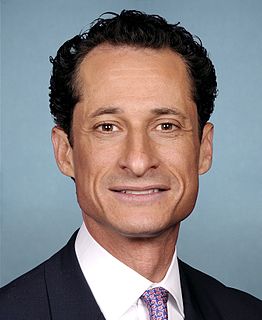A Quote by Chuck Schumer
The bottom line is there are lots of problems that were not created by government. The biggest one is loss of middle class incomes, loss of good-paying jobs which was created by technology and globalization. Above all, when you can move a job to China or India, it reduces wages.
Related Quotes
The TPP is another corporate-backed agreement that is the latest in a series of trade policies which have cost us millions of decent-paying jobs, pushed down wages for American workers and led to the decline of our middle class. We want American companies to create decent-paying jobs in America, not just low-wage countries like Vietnam, Malaysia or China. The TPP must be defeated.
Requiring the payment of higher wages will lead to a loss of some jobs and a raising of prices which drives companies to search for automation to reduce costs. On the other hand, those receiving higher wages will spend more (the marginal propensity to consume is close to 1 for low income earners) and this will increase demand for additional goods and services. Henry Ford had the clearest vision of why companies can actually benefit by paying higher wages.
The fruits of the economy and all the advantages of technology and globalization have gone far more to the investor class and the professional class and not as much to the working class. Partly because of the loss of labor unions, partly because of things like a lack of antitrust enforcement, policies that have privileged shareholder returns.
All those predictions about how much economic growth will be created by this, all of those new jobs, would be created by the things we wanted - the extension of unemployment insurance and middle class tax cuts. An estate tax for millionaires adds exactly zero jobs. A tax cut for billionaires - virtually none.
The Trump administration's economic agenda is the right agenda. Corporate taxes have been driving capital and brains and companies overseas for a decade. It has caused huge damage in investment and jobs and productivity. It was a mistake. We have to fix it. Counterintuitively, that usually helps middle-class wages, and lower-class wages, and job formation.
The size of the U.S. middle class has been shrinking. Wages have been stagnant. We don't have those factory jobs that paid a living wage and enabled a family to have a home where the wife did not have to work. But we sent our factories abroad and there is no likelihood of getting them back. Equally worrisome is that some managerial jobs and professional jobs (such as lawyers) which support middle class life are threatened by automation.
So I'm not proposing anything radical. I just believe that anybody making over $250,000 a year should go back to the income tax rates we were paying under Bill Clinton. Back when our economy created nearly 23 million new jobs, the biggest budget surplus in history, and plenty of millionaires to boot. ... At the same time, most people agree that we should not raise taxes on middle-class families or small businesses -- not when so many folks are just trying to get by.
We all accuse Vladimir Putin of Cold War nostalgia, but Washington's elites - politicians and intellectuals - miss the old days as well. They wish for the world in which the United States was utterly dominant over its friends, its foes were to be shunned entirely, and the challenges were stark, moral, and vital. Today's world is messy and complicated. China is one of our biggest trading partners and our looming geopolitical rival. Russia is a surly spoiler, but it has a globalized middle class and has created ties in Europe.































